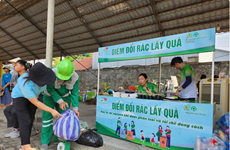“Hell market” kills endangered animals
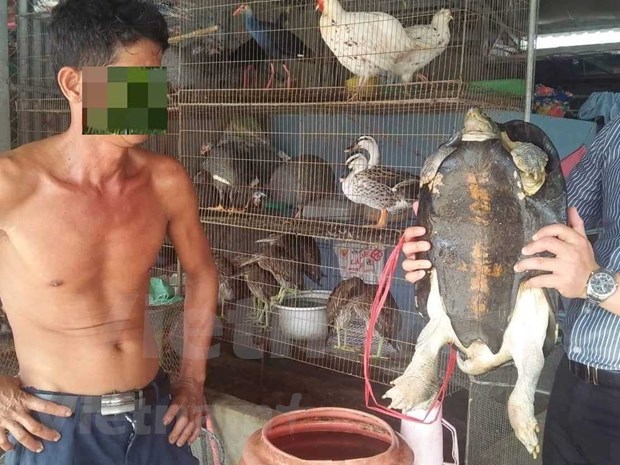 Thanh Hoa wet market in Long An is said to house thousands of endangered animals in the Mekong Delta. A booth's owner selling wild animals in Thanh Hoa wet market offers a 15-kg turtle (Photo: VietnamPlus)
Thanh Hoa wet market in Long An is said to house thousands of endangered animals in the Mekong Delta. A booth's owner selling wild animals in Thanh Hoa wet market offers a 15-kg turtle (Photo: VietnamPlus)Long An (VNA) - In the Mekong Delta province of Long An, there remains a market killing wild animals which is referred to as a hell market.
Thanh Hoa wet market in Long An is said to house thousands of endangered animals in the Mekong Delta.
[Caged life kills species in Vietnam’s Red Data Book]
It has about 40 booths with hundreds of iron cages that imprison rare birds, Asian openbills, turtles and snakes. The booths are also “slaughter houses” serving drinking parties.
Asian openbills return to… hell market
Asian openbills are the main characters of a film titled “When Asian openbills return”, which triumphed at a national environmental film festival held in early 2018.
The film features a flock of the bird helping farmers eliminate snails and flying over lush rice paddies.
In contrast, at Thanh Hoa market, hundreds of Asian openbills are forced to stay in cages, cruelly tied with sticky tape. They are scattered in stores with their wings broken and even may be slaughtered alive.
In addition, young falcons, moorcocks and eagles always tremble in constant fear as they are caught by humans when still in need of parental care.
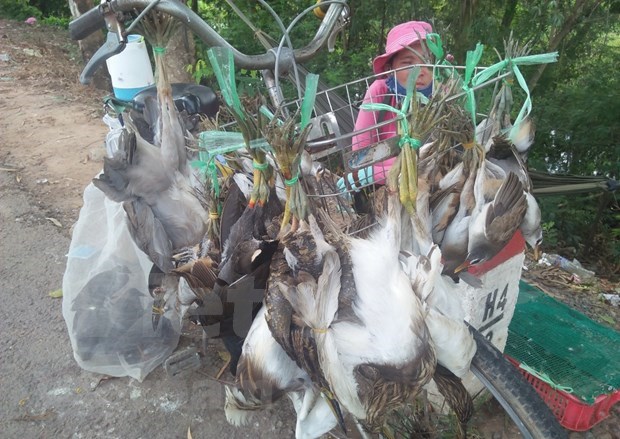 At Thanh Hoa market, water snakes and even king cobras weighing several kilograms are putting up for sale publicly, regardless of prohibition and the possibility of fines and imprisonment. Rare birds are tied together on vehicles and offered for sale in broad daylight (Photo: VietnamPlus)
At Thanh Hoa market, water snakes and even king cobras weighing several kilograms are putting up for sale publicly, regardless of prohibition and the possibility of fines and imprisonment. Rare birds are tied together on vehicles and offered for sale in broad daylight (Photo: VietnamPlus)At the market, water snakes and even king cobras weighing several kilograms are putting up for sale publicly, regardless of prohibition and the possibility of fines and imprisonment.
Meanwhile, more than 10 booths offer various species of turtle, another endangered animal. There are approximately 200 turtles held captive in the place.
A huge amount of other valuable animals, including iguana, weasel and eagle are also for sale.
Endemic or endangered animals… all end up on drinking tables
Dozens and even hundreds of transactions of birds are made in just a few days at the market in Thanh Hoa district. Shipments containing hundreds of the birds are sent to various locations, especially restaurants, across the country. Even foreigners come there to purchase the goods.
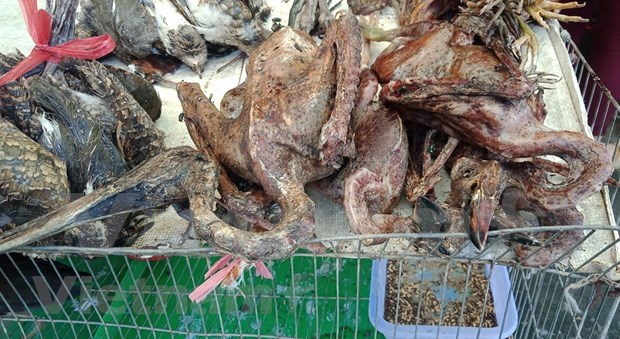 A huge amount of other valuable animals, including iguana, weasel and eagle are also for sale. Valuable birds have their feather plucked, slaughtered alive at Thanh Hoa wet market in Long An province (Photo: VietnamPlus)
A huge amount of other valuable animals, including iguana, weasel and eagle are also for sale. Valuable birds have their feather plucked, slaughtered alive at Thanh Hoa wet market in Long An province (Photo: VietnamPlus)Many tourists come to the market to gain experience. However, they can’t help but getting frightened at the horrid sight of trembling wild animals being slaughtered brutally on the spot.
The crooked figures of the animals and their desperate last shriek are in stark contrast with the delight of customers thinking of their dishes.
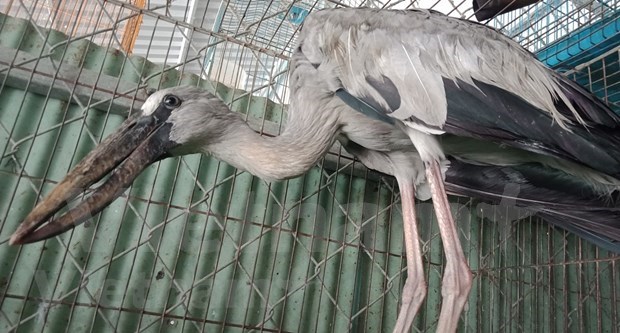 At Thanh Hoa market, hundreds of Asian openbills are forced to stay in cages, cruelly tied with sticky tape. Painted storks are caged just to be slaughtered alive (Photo: VietnamPlus)
At Thanh Hoa market, hundreds of Asian openbills are forced to stay in cages, cruelly tied with sticky tape. Painted storks are caged just to be slaughtered alive (Photo: VietnamPlus)When being asked about the sources of supply, the seller affirmed that all the animals were from the nature and sold at a price of about 250,000 - 400,000 VND (11-17 USD) per kg.
All of them come from the Tram Chim National Park, so comparing to those raised in farms for meat, they taste better, an owner of a booth at Thanh Hoa market said, adding that “endemic or endangered animals, all end up on drinking tables”.
At the areas specializing in turtle, a trader proudly said that a 15-kg turtle of her shop, enough to serve 20 people, was from Cambodia.
The Thanh Hoa market was set up decades ago, originally a small-scale wet market alongside a national highway. It mainly served drivers and tourists of long-distance trips, and now has turned into a wildlife trade hotspot.
The Forest Protection Department at the Vietnam Administration of Forestry, along with the forest protection offices of Dong Thap and Long An provinces were informed of the situation. However, their efforts have not met expectations./.













